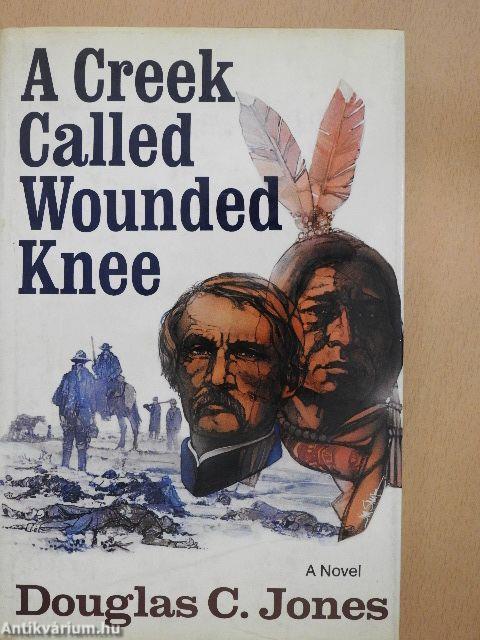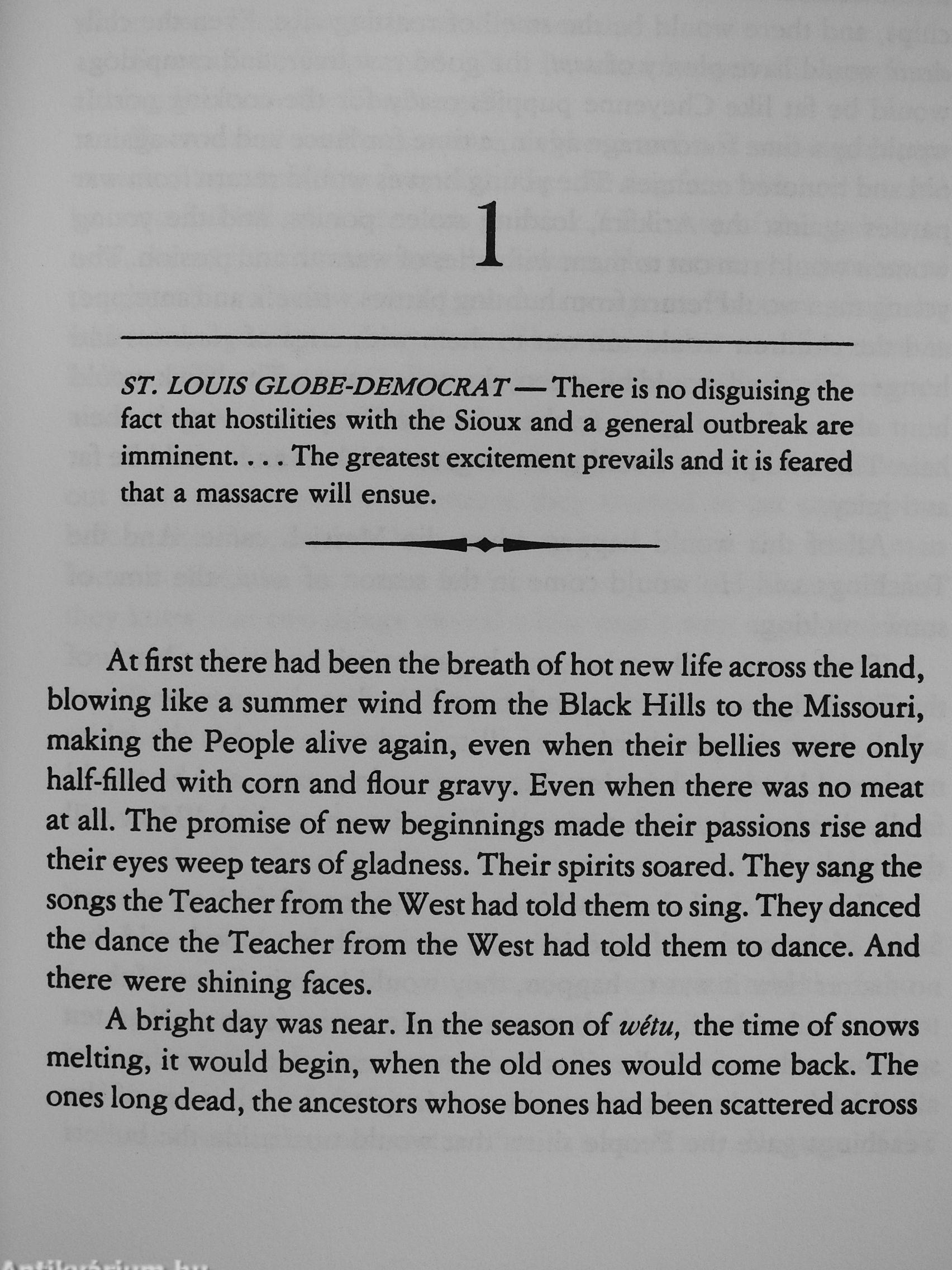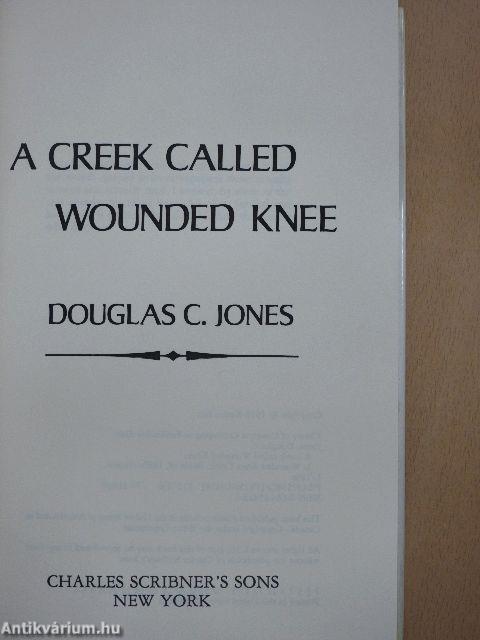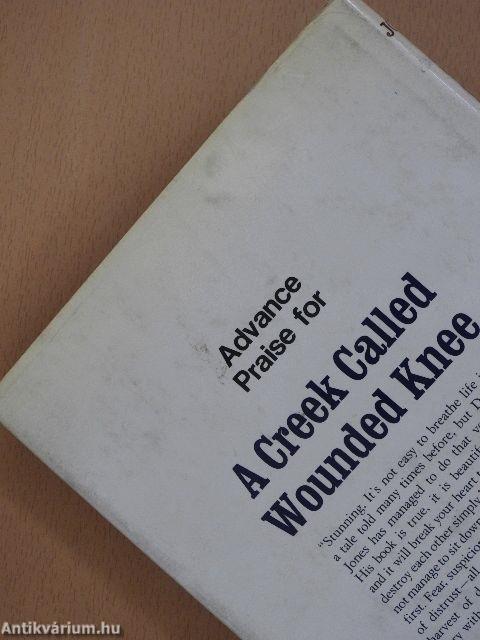1.067.053
kiadvánnyal nyújtjuk Magyarország legnagyobb antikvár könyv-kínálatát

VISSZA
A TETEJÉRE
JAVASLATOKÉszre-
vételek
A Creek Called Wounded Knee
| Kiadó: | Charles Scribner's Sons |
|---|---|
| Kiadás helye: | New York |
| Kiadás éve: | |
| Kötés típusa: | Fűzött keménykötés |
| Oldalszám: | 236 oldal |
| Sorozatcím: | |
| Kötetszám: | |
| Nyelv: | Angol |
| Méret: | 24 cm x 16 cm |
| ISBN: | 0-684-15822-1 |
naponta értesítjük a beérkező friss
kiadványokról
naponta értesítjük a beérkező friss
kiadványokról
Előszó
TovábbFülszöveg
I
18.95
n his new novel Douglas C. Jones turns to perhaps the most heartbreaking of battles, the Battle of Wounded Knee.
It is December 1890. The Lakota Sioux are closely watched. Most seem docile, living peacefully on reservations or at Indian agencies. But some refuse to be subdued.
Army troops are sent to contain the hostiles: Colonel Forsyth, regimental commander, in the field for the first time against the Indian; Captain Wallace, a Union soldier formerly posted in South Carolina, where he learned what it means to be scorned. Newspapermen come to the Dakotas in droves, among them Quinton Tapp, frontier roustabout, now a reporter for the Omaha Bee; and the Chicago Herald s well-proportioned Widow Duncan, who uses her charms to get what she wants. Big Foot, called Peacemaker among the Sioux, struggles against old age and illness to bring Indian and white together. And at his side young Talks With Horses protects him from those who would fight rather than trust a white... Tovább
Fülszöveg
I
18.95
n his new novel Douglas C. Jones turns to perhaps the most heartbreaking of battles, the Battle of Wounded Knee.
It is December 1890. The Lakota Sioux are closely watched. Most seem docile, living peacefully on reservations or at Indian agencies. But some refuse to be subdued.
Army troops are sent to contain the hostiles: Colonel Forsyth, regimental commander, in the field for the first time against the Indian; Captain Wallace, a Union soldier formerly posted in South Carolina, where he learned what it means to be scorned. Newspapermen come to the Dakotas in droves, among them Quinton Tapp, frontier roustabout, now a reporter for the Omaha Bee; and the Chicago Herald s well-proportioned Widow Duncan, who uses her charms to get what she wants. Big Foot, called Peacemaker among the Sioux, struggles against old age and illness to bring Indian and white together. And at his side young Talks With Horses protects him from those who would fight rather than trust a white man. It is the beginning of the end.
Of Douglas C. Jones's most recent novel, the New York Times said, "Arrest Sitting Bull is written with supple and effective simplicity; the narrator's stoic awareness of the enormity of history itself gives this narrative a compelling dignity." The Los Angeles Times said, "Arrest Sitting Bull rings throughout with an absolutely riv-etting sound of authenticity." And Kirkus Reviews called it "an enthralling elegy for a people 'who were here—and are gone." " Douglas C. Jones brings the same impressive skills to his present story—an authentic and powerful portrayal of men soon to be caught in the ultimate test of their valor, as they ride, unknowing, to the Battle of Wounded Knee.
Advance Praise for
A Creek Called Wounded Knee
"Stunning. It's not easy to breathe life into a tale told many times before, but Douglas Jones has managed to do that very thing. His book is true, it is beautifully written, and it will break your heart to see good men destroy each other simply because they could not manage to sit down and talk to each other first. Fear, suspicion, an embalmed tradition of distrust—all combine to bring about a harvest of death, and Jones has told the story with the hand of a master."
—Elliott Arnold Vissza
Témakörök
- Idegennyelv > Idegennyelvű könyvek > Angol > Szépirodalom > Regény, novella, elbeszélés
- Szépirodalom > Regény, novella, elbeszélés > Tartalom szerint > Történelmi regények > Újkor > Egyéb
- Szépirodalom > Regény, novella, elbeszélés > Tartalom szerint > Földrajzi besorolások > Amerika, USA
- Szépirodalom > Regény, novella, elbeszélés > Tartalom szerint > Indiánok, vadnyugat
- Szépirodalom > Regény, novella, elbeszélés > Tartalom szerint > Társadalmi csoportok > Kisebbségek > Egyéb
- Szépirodalom > Regény, novella, elbeszélés > Tartalom szerint > Háborús történetek
- Szépirodalom > Regény, novella, elbeszélés > Tartalom szerint > Kor- és társadalomrajz












